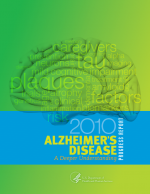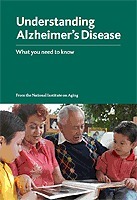From the National Institute on Aging
As a healthcare professional, you are often the first to address a patient’s complaints—or a family’s concerns—about memory loss or possible dementia. This quick guide provides information about assessing cognitive impairment in older adults.
With this information, you can identify emerging cognitive deficits and possible causes, following up with treatment for what may be a reversible health condition. Or, if Alzheimer’s disease or another dementia is found, you can help patients and their caregivers prepare for the future. Brief, nonproprietary risk assessment and screening tools are available.
Why is it important to assess cognitive impairment in older adults?
 Cognitive impairment in older adults has a variety of possible causes, including medication side effects, metabolic and/or endocrine derangements, delirium due to intercurrent illness, depression, and dementia, with Alzheimer’s dementia being most common. Some causes, like medication side effects and depression, can be reversed with treatment. Others, such as Alzheimer’s disease, cannot be reversed, but symptoms can be treated for a period of time and families can be prepared for predictable changes.
Cognitive impairment in older adults has a variety of possible causes, including medication side effects, metabolic and/or endocrine derangements, delirium due to intercurrent illness, depression, and dementia, with Alzheimer’s dementia being most common. Some causes, like medication side effects and depression, can be reversed with treatment. Others, such as Alzheimer’s disease, cannot be reversed, but symptoms can be treated for a period of time and families can be prepared for predictable changes.
Many people who are developing or have dementia do not receive a diagnosis. One study showed that physicians were unaware of cognitive impairment in more than 40 percent of their cognitively impaired patients. Another study found that more than half of patients with dementia had not received a clinical cognitive evaluation by a physician. The failure to evaluate memory or cognitive complaints is likely to hinder treatment of underlying disease and comorbid conditions, and may present safety issues for the patient and others. In many cases, the cognitive problem will worsen over time.
Most patients with memory, other cognitive, or behavior complaints want a diagnosis to understand the nature of their problem and what to expect. Some patients (or families) are reluctant to mention such complaints because they fear a diagnosis of dementia and the future it portends. In these cases, you can explain the benefits of finding out what may be causing the patient’s health concerns.
Pharmacological treatment options for Alzheimer’s-related memory loss and other cognitive symptoms are limited, and none can stop or reverse the course of the disease. However, assessing cognitive impairment and identifying its cause, particularly at an early stage, offers several benefits.
Benefits of Early Screening
If screening is negative: Concerns may be alleviated, at least at that point in time.
If screening is positive and further evaluation is warranted: The patient and physician can take the next step of identifying the cause of impairment (for example, medication side effects, metabolic and/or endocrine imbalance, delirium, depression, Alzheimer’s disease). This may result in:
- Treating the underlying disease or health condition
- Managing comorbid conditions more effectively
- Averting or addressing potential safety issues
- Allowing the patient to create or update advance directives and plan long-term care
- Ensuring the patient has a caregiver or someone to help with medical, legal, and financial concerns
- Ensuring the caregiver receives appropriate information and referrals
- Encouraging participation in clinical research
When is screening indicated?
The U.S. Preventive Services Task Force, in its recent review and recommendation regarding routine screening for cognitive impairment, noted that “although the overall evidence on routine screening is insufficient, clinicians should remain alert to early signs or symptoms of cognitive impairment (for example, problems with memory or language) and evaluate as appropriate.” A Dementia Screening Indicator can help guide clinician decisions about when it may be appropriate to screen for cognitive impairment in the primary care setting.
How is cognitive impairment evaluated?
Positive screening results warrant further evaluation. A combination of cognitive testing and information from a person who has frequent contact with the patient, such as a spouse or other care provider, is the best way to more fully assess cognitive impairment.
A primary care provider may conduct an evaluation or refer to a specialist such as a geriatrician, neurologist, geriatric psychiatrist, or neuropsychologist. If available, a local memory disorders clinic or Alzheimer’s Disease Center may also accept referrals.
Genetic testing, neuroimaging, and biomarker testing are not generally recommended for clinical use at this time. These tests are primarily conducted in research settings.
Interviews to assess memory, behavior, mood, and functional status (especially complex actions such as driving and managing money are best conducted with the patient alone, so that family members or companions cannot prompt the patient. Information can also be gleaned from the patient’s behavior on arrival in the doctor’s office and interactions with staff.
Note that patients who are only mildly impaired may be adept at covering up their cognitive deficits and reluctant to address the problem.
Family members or close companions can also be good sources of information. Inviting them to speak privately may allow for a more candid discussion. Per HIPAA regulations, the patient should give permission in advance. An alternative would be to invite the family member or close companion to be in the examining room during the patient’s interview and contribute additional information after the patient has spoken.
Brief, easy-to-administer informant screening tools, such as the short IQCODE (PDF, 62K) or the AD8 (PDF, 565K), are available.
Points to Remember
Patients should be screened for cognitive impairment if:
- the person, family members, or others express concerns about changes in his or her memory or thinking, or
- you observe problems/changes in the patient’s memory or thinking, or
- the patient is age 80 or older.(12)
- Other risk factors that could indicate the need for dementia screening include: low education, history of type 2 diabetes, stroke, depression, and trouble managing money or medications.
- Instruments for brief screening are available and can be used in an office visit.
- Patients, particularly those who express a concern, likely want to know what the underlying problem is.
- Refer to a specialist if needed.
Professional Development Resources is approved by the American Psychological Association (APA) to sponsor continuing education for psychologists; by the National Board of Certified Counselors (NBCC ACEP #5590); by the Association of Social Work Boards (ASWB Provider #1046, ACE Program); by the American Occupational Therapy Association (AOTA Provider #3159); by the American Speech-Language-Hearing Association (ASHA Provider #AAUM); by the Commission on Dietetic Registration (CDR Provider #PR001); by the California Board of Behavioral Sciences (#PCE1625); by the Florida Boards of Social Work, Mental Health Counseling and Marriage and Family Therapy (#BAP346), Psychology & School Psychology (#50-1635), Dietetics & Nutrition (#50-1635), Speech-Language Pathology and Audiology, and Occupational Therapy Practice (#34); by the Ohio Counselor, Social Worker & MFT Board (#RCST100501); by the South Carolina Board of Professional Counselors & MFTs (#193); and by the Texas Board of Examiners of Marriage & Family Therapists (#114) and State Board of Social Worker Examiners (#5678).
Professional Development Resources offers a variety of online Alzheimer’s and Dementia-related continuing education (CE/CEU) courses to help healthcare professionals stay current on the science and research to support evidence-based practice.







